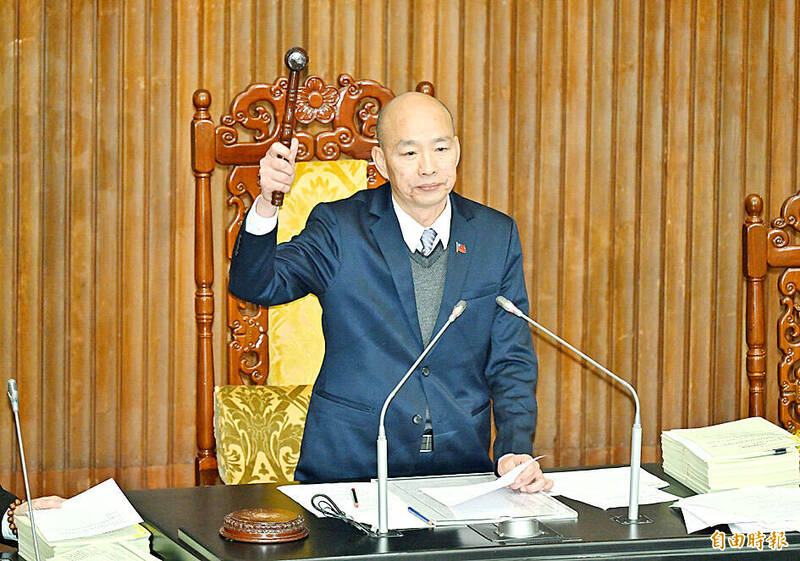《TAIPEI TIMES》Police officer pension reform passed

Legislative Speaker Han Kuo-yu hits the gavel as the Legislative Yuan passes amendments to the Police Personnel Management Act in Taipei yesterday. Photo: Tien Yu-hua, Taipei Times
By Hsieh Chun-lin, Lin Hsin-han, Jake Chung and Sam Garcia / Staff reporters, with staff writers
The Legislative Yuan yesterday passed a bill on pension reform for police by amending the Police Personnel Management Act (警察人員人事條例) to raise the maximum income replacement ratio to 80 percent for those serving 36 years or more.
The amended bill stated that the monthly income replacement ratio for police, firefighters, coast guard personnel, National Immigration Agency officers and airborne service personnel should be set at 43.25 percent for those in service for 15 years, with the ratio going up by 1.75 percentage points per year until they reach 80 percent at 36 years of service.
For those who have served for 37 years or more, the income replacement ratio would remain at 80 percent, while those who have less than a year left until retirement would have different calculations, according to the amendments.
The amendments would apply to those who retire before the amended article goes into effect, with their monthly pension recalculated based on the wage standards of those in the same rank.
Retired Police Officers’ Association head Keng Chi-wen (耿繼文) said that all police officers, firefighters and coast guard personnel, whether incumbent or retired, thanked the Legislative Yuan for “this much-delayed justice.”
“We are not fighting for additional benefits; we are asking the government to treat us fairly and reasonably, and to give us our due as promised,” he said.
Police officers, firefighters and coast guard personnel perform high-risk duties and are a stabilizing force for the state and society, he said, adding that the amendments would boost the morale of members of these vocations.
On the other hand, the Economic Democracy Union and the Taiwan Labor Front said that with the amendments, the base monthly pension for front-line police officers would be NT$74,544, almost double that of standard wages for laborers.
The amendment would only increase the wealth gap and sacrifice the younger generation, they said.
Democratic Progressive Party (DPP) Legislator Rosalia Wu (吳思瑤) said the amendments risk contravening the principle of equality as espoused by the Constitution and would create generational conflict among public servants.
DPP caucus whip Ker Chien-ming (柯建銘) said the caucus would file for a constitutional interpretation, adding that the Executive Yuan would consider sending the bill back to lawmakers for reconsideration or other constitutional remedies.
Meanwhile, the Legislative Yuan yesterday also passed the Strong Generation Policy and Industrial Development Act (壯世代政策與產業發展促進法), aimed at developing people’s industrial capabilities and supporting their mental and physical health. The act defines the “strong generation” as people aged 55 or older with the ability and willingness to work.
The legislation would take effect on Jan. 1 next year with the National Development Council as the competent authority.
The act stipulates that the government would have two years from its implementation to publish a white paper on policies targeting the age group.
It should conduct periodic reviews based on policy performance, and domestic and international developments, the bill says.
The act has five distinguishing features, Taiwan People’s Party Legislator Wu Chun-cheng (吳春城) said.
It would help Taiwan painlessly move from an aged society to a super-aged society, he said, adding that the act supports care and development for the people in the strong generation, and reduces pressure on younger generations.
The act stipulates that the government promote the development of industry for Taiwanese aged 55 or older, and cultivate entrepreneurship and industrial chains.
Additionally, it aims to establish financial action plans for the generation and provide education to bolster financial literacy.
The act stipulates that government agencies work together with public and private sectors, as well as academic institutions to enhance research on topics related to the strong generation and the application of that research.
The government must also conduct a national survey on the status of the middle-aged generation at least once every five years, publishing their findings in a report, the act says.
The government should promote the employment of people in the group with flexible working models, develop respectful and friendly workplace environments, and establish suitable training mechanisms, it says.
It also stipulates that the government should promote investment in medical care to support the mental and physical health of the group.
The government should also enhance technology and agricultural management for farmers in the age group, it says.
新聞來源:TAIPEI TIMES















